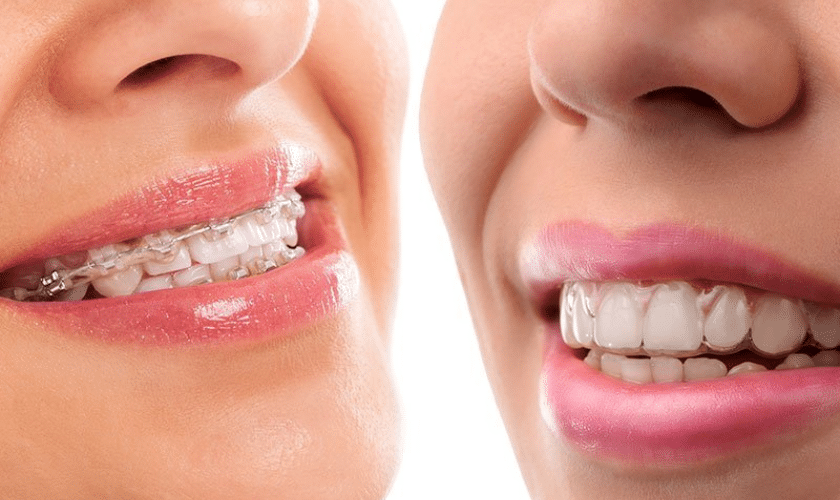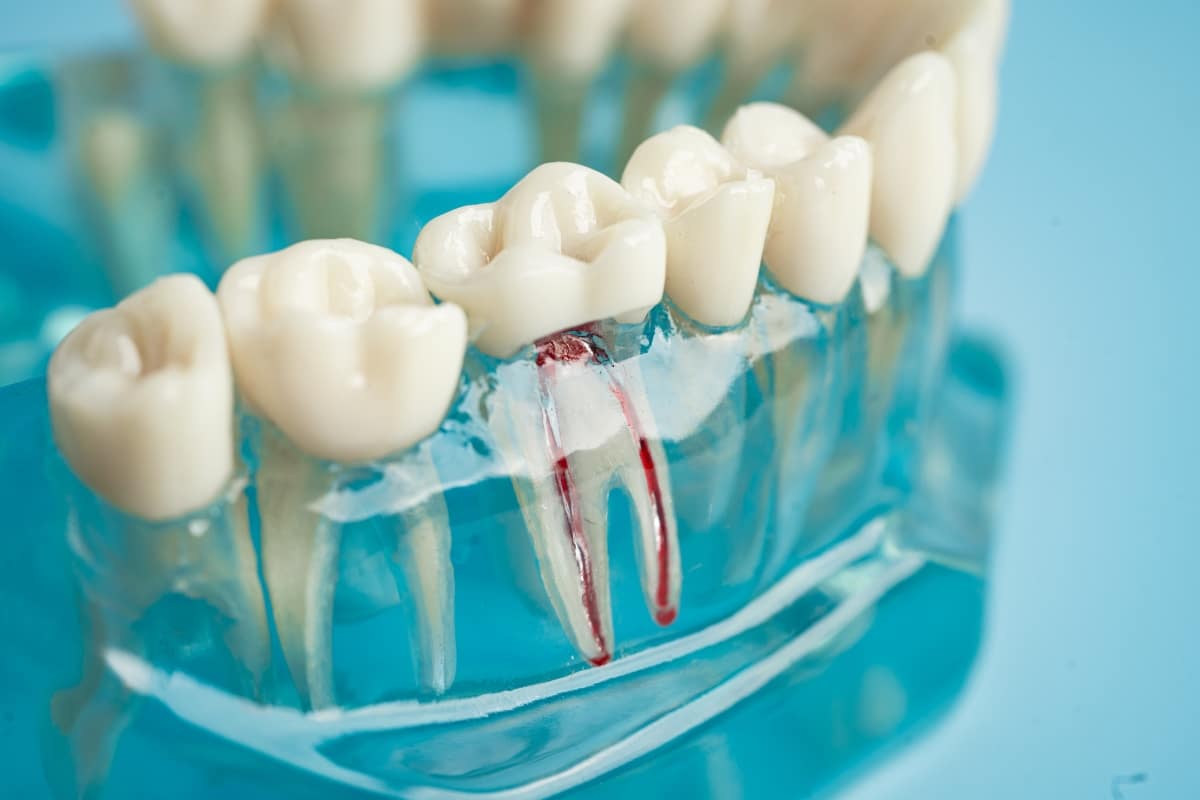Same-day treatments are available.
Why Choose Invisalign Over Braces

A dazzling smile can boost your confidence and make a lasting impression. But if misaligned teeth are holding you back, you might be considering orthodontic treatment. Invisalign and conventional braces are two popular options. While both methods achieve straighter teeth, they differ significantly in aesthetics, comfort, and lifestyle impact. This comprehensive guide will delve into the key factors to consider when choosing Invisalign over braces.
Understanding Invisalign and Braces
- Invisalign: This system utilizes a series of clear, removable aligners that gently shift your teeth into the desired position. The aligners are custom-made using advanced digital technology and are virtually invisible when worn.
- Traditional Braces: Metal brackets are bonded to your teeth, connected by wires that gradually apply pressure to move your teeth. While effective, braces can be noticeable and may cause some discomfort.
Advantages of Invisalign Over Braces
1. Discreet Appearance:
Perhaps the most significant advantage of Invisalign is its near invisibility. The clear aligners blend seamlessly with your teeth, making them a perfect choice for adults and teenagers who are self-conscious about having braces.
2. Enhanced Comfort:
Traditional braces can irritate your cheeks and gums due to the brackets and wires. Invisalign aligners are made of smooth plastic, eliminating the risk of these abrasions. Additionally, there’s no need for adjustments that can cause temporary soreness with braces.
3. Dietary Freedom:
With braces, you need to avoid certain foods that can damage the brackets or wires. Invisalign allows you to enjoy all your favorite foods without restrictions. Simply remove your aligners before eating and brush your teeth before putting them back in place.
4. Improved Oral Hygiene:
Maintaining good oral hygiene can be challenging with braces due to the difficulty of cleaning around brackets and wires. Invisalign allows for easy removal, making brushing and flossing your teeth a breeze, which is crucial for maintaining good oral health throughout treatment.
5. Fewer Appointments:
Unlike braces that require regular adjustments, Invisalign treatment often involves fewer appointments with your dentist in Cypress. You’ll receive a series of aligners to wear for a specific period, typically two weeks, before switching to the next set.
6. Potential for Faster Treatment:
In some cases, Invisalign treatment can be faster than traditional braces. However, the exact duration depends on your individual case and the complexity of your misalignment.
7. Potential Benefits Beyond Straightening:
Invisalign may offer additional benefits beyond straightening teeth. Studies suggest it can improve gum health and even reduce snoring in some patients.
Suitability of Invisalign
While Invisalign offers numerous advantages, it might not be suitable for everyone. A list of some things to consider is provided below:
Complexity of Misalignment:
The majority of mild to moderate cases of misalignment respond well to Invisalign. If you have severe crowding or complex bite issues, traditional braces might be a better choice.
Discipline and Compliance:
Invisalign requires a high level of discipline. You need to wear the aligners for at least 22 hours a day and consistently switch to the next set of aligners as prescribed by your dentist.
Cost:
Invisalign treatment is typically more expensive than traditional braces. However, the cost can vary depending on your location, dentist, and treatment complexity.
Consulting a Dentist
If you’re considering Invisalign over braces, scheduling a consultation with a dentist experienced in Invisalign treatment is crucial. They will assess your individual needs, discuss your goals, and determine if Invisalign is the right choice for you.
During the consultation, the dentist will:
- Perform a thorough oral examination
- Discuss your medical history
- Take X-rays and digital scans of your teeth
- Create a personalized treatment plan
- Respond to any questions or concerns you may have.
Deciding between Invisalign and braces is a personal choice. Knowing the advantages and disadvantages of each option is crucial for making an informed decision. Invisalign over braces provides a discreet, comfortable, and convenient alternative for many patients seeking orthodontic treatment. However, consulting with a qualified dentist is essential to ascertain whether Invisalign is the best solution to achieve your desired smile.
Additional Considerations
- Dental Insurance: Some dental insurance plans might offer coverage for Invisalign treatment. Be sure to check with your insurance provider to understand your specific coverage details.
- Invisalign Treatment Options: There are different types of Invisalign treatment available, such as Invisalign Lite for minor corrections and Invisalign Teen for teenagers.
- Maintaining Your Smile: Once you’ve achieved your desired smile, it’s crucial to maintain it with proper oral hygiene practices and regular dental checkups with your dentist in Cypress.
By carefully considering the information presented in this guide and discussing your options with a qualified dentist, you can confidently choose the best path towards a straighter, healthier, and more confident smile.
Invisalign vs. Braces: A Deep Dive
This blog has provided a general overview of why you might choose Invisalign over braces. Now, let’s delve deeper into some key aspects to help you make an informed decision.
Treatment Timeline and Cost
- Treatment Timeline: While both methods aim to straighten your teeth, the treatment duration can vary. Traditional braces typically take 18-24 months, while Invisalign treatment can range from 6-18 months. The timeline in question is contingent upon the intricacy of your case.
- Cost: Generally, Invisalign treatment is more expensive than braces upfront. However, consider the potential for fewer appointments and the ability to maintain your regular diet, which can lead to cost savings in other areas. Additionally, some employers offer Flexible Spending Accounts (FSAs) that can be used to help cover orthodontic treatment costs.
Lifestyle Impact
- Social Interactions: Traditional braces can be quite noticeable, potentially impacting your confidence in social settings. Invisalign’s virtually invisible nature allows you to smile freely without feeling self-conscious.
- Travel: Traveling with braces requires carrying a special orthodontic cleaning kit and being mindful of what you eat. Invisalign allows for easy removal and cleaning, making travel more convenient.
- Athletic Activities: Braces can increase your risk of mouth injuries during sports. Invisalign aligners can be removed during physical activities, reducing this risk.
Managing Treatment
- Wearing Time: Invisalign requires consistent wear time, typically around 22 hours per day. Ensure you’re disciplined enough to wear the aligners as prescribed for optimal results.
- Changing Aligners: You’ll need to switch to a new set of aligners every one to two weeks. Following this schedule is crucial for maintaining consistent pressure on your teeth and achieving the desired outcome.
- Cleaning and Care: It’s essential to clean your Invisalign aligners daily with a soft toothbrush and toothpaste. You can also use an Invisalign cleaning solution for deeper cleaning. Proper care ensures the aligners remain clear and free of bacteria.
Addressing Potential Concerns
- Discomfort: Both Invisalign and braces can cause some initial discomfort when starting treatment. With braces, this discomfort can be due to the tightening process, while Invisalign aligners might cause temporary pressure as your teeth shift. Over-the-counter pain relievers can usually help manage this discomfort.
- Speaking: Some people experience slight speech impediments when they first start wearing Invisalign aligners. This typically resolves within a few days as your tongue adjusts to the aligners.
- Losing Aligners: Losing an aligner can disrupt your treatment plan. While replacement aligners can be ordered, it’s important to be careful and keep track of your aligners.
Choosing Invisalign over braces is a personal decision that depends on your individual needs, lifestyle, and preferences.
Here is a brief summary of the important things to think about:
- Aesthetics: Invisalign offers a virtually invisible solution, while braces are more noticeable.
- Comfort: Invisalign is generally more comfortable than traditional braces.
- Diet: Invisalign allows for a normal diet, while braces require dietary restrictions.
- Oral Hygiene: Using Invisalign makes it simpler to maintain proper oral hygiene.
- Treatment Duration: The treatment duration can be similar for both options, but might be slightly shorter with Invisalign in some cases.
- Cost: Invisalign is typically more expensive upfront than braces.
- Lifestyle: Invisalign offers more flexibility and convenience in terms of travel, social interactions, and athletic activities.
Remember:
Consulting with a qualified dentist is essential to determine if choosing Invisalign over braces is the right decision for you. They can assess your individual situation, develop a personalized treatment plan, and address any questions or concerns you may have.
By carefully considering your options and having a consultation with a dentist in Cypress, you can confidently embark on the journey towards achieving a straighter, healthier, and more beautiful smile with Invisalign.

7 Foods and Drinks to Avoid After Professional Teeth Whitening in Cypress

What to Expect After a Root Canal Treatment in Cypress



